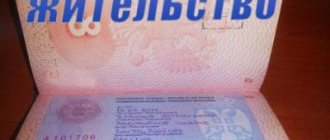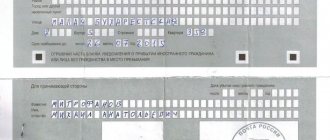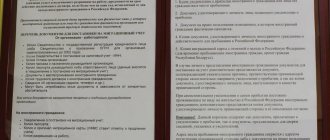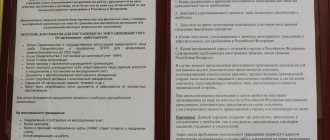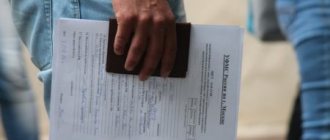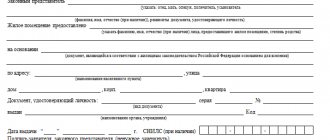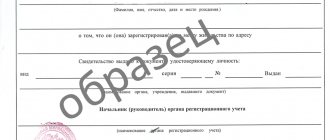Having received a temporary residence permit (TRP), a foreign citizen (IG) is required to go through the registration procedure at the place of residence .
provides a period of 7 days for this procedure .
The registration procedure, in other words, registration after receiving a temporary residence permit, is strictly regulated and has some nuances.
Read our article about the rules and procedure for registering foreign citizens at their place of residence.
Rights and obligations of a temporary resident in the Russian Federation
115-FZ “On the legal status of foreign citizens” states:
- Within 7 days, he is obliged to register with the Main Directorate for Migration of the Ministry of Internal Affairs of the Russian Federation;
- If it is impossible to register within the period established by law, it is necessary to register for migration;
- A temporarily residing citizen cannot independently and at his own request change his place of residence outside the subject in which he received a certificate for a temporary residence permit;
- A citizen does not have the right to get a job or conduct business outside the entity in which the permit was obtained;
- Provide a certificate of tax registration without fail within a month to the department of the Main Department of Internal Affairs of the Ministry of Internal Affairs of the Russian Federation in Moscow;
- A temporary resident is obliged, after 2 months after the end of the year of residence, to provide the MFC with a certificate of income for the current year and confirm his residence in the country.
General information about RVP
In accordance with Art. 2 of Federal Law No. 115 of July 25, 2002 “On the legal status of foreign citizens in the Russian Federation”, a temporary residence permit is proof that a person who is not a citizen of the Russian Federation has the right to temporarily reside on its territory until receiving a residence permit.
The temporary residence permit status is issued in the form of a stamp in the foreigner’s passport (for a stateless person - a separate document) and cannot be issued in any other way. Its validity period is 3 years, but if a foreigner intends to continue living in Russia after the end of this period, he must obtain a residence permit.
As stated in Art. 6 Federal Law No. 115, temporary residence permits are issued to foreigners within the regional quota - each subject of the Federation has its own figures, and in Russia as a whole, 90.3 thousand quotas for temporary temporary residence permits are allocated.
The following can bypass the quota:
- former citizens of the USSR;
- disabled parents of citizens of the Russian Federation and children of disabled Russians;
- spouses of Russian citizens;
- investors in the Russian economy;
- participants in the compatriots resettlement program and some others.
Find out more information on the topic from the material “What is RVP”.
Where to register?
According to Article No. 14 of the Federal Law “On Migration Registration,” an IG is required to register at his place of residence within seven days after receiving a temporary residence permit.
You can register in the following areas:
- own residential property;
- housing of relatives or friends;
- municipal apartment;
- rented premises.
Each of these options requires the provision of a document confirming the right to move into the premises . The residential premises must be located in the region in which the temporary residence permit was issued.
For example, having received a temporary residence permit in the Moscow region, you can register in any city included in a given subject of the Russian Federation. In this case, registration in an apartment located in Moscow is impossible, as is registration in any other city of the Russian Federation.
When registering a temporary residence permit, a foreign citizen must indicate the intended place of future registration. However, there is no legal obligation to subsequently register at this address.
A migrant can register at any address , and during his stay in Russia under a temporary residence permit, change his registration address an unlimited number of times.
Violation of the registration deadlines is punishable by a fine of 2 to 5 thousand rubles or cancellation of the temporary residence permit (Article 18.8 of the Code of Administrative Offenses of the Russian Federation).
Change of place of residence within the region
As mentioned earlier, the owner of a temporary residence permit has the right to live and work only within the region where such a permit was issued. However, according to paragraph 2 of Art. 11 Federal Law No. 115, even within this region, he does not have the right to arbitrarily change and choose a new place of residence, outside the address at which he is registered. To do this, he must first notify the migration authorities about the change of place of residence and obtain approval for this.
But in this case there is one problem. The previously in force Administrative Regulations (approved by order of the FMS dated February 29, 2008 No. 40) provided for a corresponding procedure, which was called “Obtaining permission to change place of residence.” But due to changes in legislation and, in particular, the reorganization of the Federal Migration Service, it was canceled. The current Regulations do not provide for such a procedure, however, the rule prohibiting unauthorized change of place of residence continues to apply.
All this means that the procedure for changing the place of residence provides only a notification nature - there is no mandatory requirement to obtain permission for this from the Main Directorate for Migration. Thus, to change your place of residence, it is enough to submit an application to the GUVM in free form either at your current place of residence or at a new address.
Reasons for changing residence
It goes without saying that the reasons for such a change must be justified and they must be indicated in the application sent to the territorial office of the Main Directorate for Migration. Migration authorities will consider the significance of such a reason, and if it turns out to be compelling, they will give their consent.
Despite the prohibitive nature of the norm, which does not allow unauthorized change of place of residence to a new one, as a rule, GUVM employees approve of the migration of foreigners within the region. The main thing is that there is a sufficient reason.
Extenuating circumstances may include:
- permanent registration of close relatives or family members in a new place, especially if they need care, have their own home, are dependents or, conversely, bear the burden of a breadwinner;
- availability of ownership of residential premises within the region, receipt of social housing;
- opening an individual entrepreneur at a new location, establishing a commercial company;
- family circumstances, for example, marriage or inheritance;
- employment in another locality, and so on.
Documents, state duty
An application for a change of residence, as already mentioned, is submitted either at the place of permitted residence or at a new place of residence. The forms of such an application are not approved by law, and therefore it must be drawn up in free form.
The application must indicate:
- name of the migration authority, name and position of the head of the GUVM unit;
- personal details of the applicant, address of the authorized place of registration;
- a document proving the identity of the foreigner, the grounds for his temporary residence (by whom and when the temporary residence permit was provided, its validity period);
- a request to allow a change of residence within the region;
- address of new place of residence;
- reasons for changing place of residence;
- information about the residential premises in which the foreigner intends to live (information about the owner, the grounds on which the foreigner will use the premises);
- list of attached documents;
- date, signature.
So that readers understand what such a statement should look like, below we post an example of such a statement.
The foreign citizen must attach to the application:
- a copy of the passport with a note about the temporary residence permit;
- a document confirming the right to use housing at the new place of residence;
- a document confirming the existence of a compelling reason requiring a change of residence (certificate of health of a relative, marriage certificate, etc.).
After receiving a positive response from the territorial office of the Department of Migration, the foreigner must deregister at the old address and register at the new place of residence within 7 days after moving. To do this, he must submit an application, the form of which is approved by the Administrative Regulations of the Ministry of Internal Affairs. Below you can see a sample of it.
When filing an application to change your place of residence, no fees or charges are established by law. As for the re-registration itself at a new place of residence, the so-called price, or the amount of the state fee, will be 350 rubles in 2021.
What types of registration after temporary residence permit can be
Registration after a temporary residence permit of a foreigner can be divided into 2 types :
- registration at the place of residence (temporary) - used when for some reason it is not possible to find a place for permanent registration at the place of residence after receiving a temporary residence permit. Its duration can be any and depends on the agreements with the party providing the residential premises, but most often it is registration for 3 years (for the duration of the temporary residence permit);
- registration at the place of residence (permanent) - it is permanent and does not provide for a limitation on the period of validity. It is usually called “registration under temporary residence permit”. Usually, this is done only when a migrant registers in his own housing, or housing obtained under a social tenancy agreement or lease. The main difference from a temporary one is that it cannot be terminated due to the expiration of the period.
At the same time, he is allowed to register only in the following types of residential premises :
- Own residential property.
- Real estate owned by relatives or friends .
- Premises provided by the municipality .
- Rented property .
Your actions after a quota refusal
If quotas have run out in this region, then you can try to apply next year.
It will be very problematic to appeal the commission’s decision in court if you received a categorical refusal for a justified reason. It is better not to count on positive success.
It is unlikely that it will be possible to appeal the commission’s decision to refuse to provide a quota.
A refusal to provide a temporary residence permit can be appealed administratively or judicially , but you will only have three days to do so from the date of receipt of the refusal. You can find out how long it takes for a claim to be considered in court here.
Registration after receiving a temporary residence permit
A person who has his own personal or rented home has the right to register or register after receiving a temporary residence permit.
The subject has the right to register where he intends to live, in one of the local offices of the following government agencies :
- MFC;
- migration service;
- police;
- online through the State Services service.
Registration is carried out on the date of submission of documentation. For the procedure you must pay a state fee of 350 rubles . This amount is not paid by a person living under the state resettlement program.
What documents are needed for registration
The registering organization is provided with:
- RVP form of the established form . Filled out manually or on a computer, signed by the subject;
- passport with notarized and translated copies;
- documentation for the object and the rights of the subject (house register, purchase and sale transaction, certificate from the register);
- ID card of the person providing the premises . He must come to the government body himself, and if there are co-owners, they can provide their opinion certified by a notary;
- documentary grounds giving authority to a foreigner to live in the premises ( written lease agreement ).
A registered person has the right to register his minor children without the consent of the property owner. Their temporary registration will end at the same time as their parent's.
It is important to comply with additional requirements:
- If housing is rented from unauthorized persons, the consent of all owners is required .
- If a foreigner is registered with relatives, then the relationship must be documented .
- The owner (with the consent of the others) is obliged to be present when the subject submits papers to the registration authority.
- If a foreigner owns several residential premises, then registration is recorded at the address of one of them , and the rest of the housing is reported.
- The foreigner confirms (fingerprint) procedure
The registration authority may impose additional requirements (for example, a photograph).
Additional Documentation
The above list is minimal and can be expanded. If a migrant is registered at the place of stay with relatives, notarized consent of all owners will be required. If you have this document, the presence of all homeowners will not be required.
The consent may not be notarized if it is drawn up directly at the place of registration, but then all owners must provide identification documents. You must also have documents confirming the ownership of your home with you.
Download owner's consent
If a newborn child is temporarily registered, then the child’s birth certificate will be required, and the consent of the owners is no longer necessary.
The possibility of such registration of minors raises concerns among homeowners; however, it ceases along with the registration of parents.
How to increase your chances of getting a quota?
The number of people wishing to receive a quota is, as a rule, much greater than the number of quotas themselves. To avoid missing application deadlines and increase your chances of receiving a positive decision, pay attention to the following:
- Pay special attention to collecting documents. Even if the list contains a minimum of documents, you should not treat this formally. The more complete the package of papers, the greater the chance that the quota will be granted. When indicating the place of work, it is worth attaching an employment contract, or even more effectively, a petition from the employer. If you have housing, you can attach an extract from the unified register and a rental agreement. The more evidence of business and family ties with the country, the higher the chances;
- documents must be collected in advance. Naturally, the prerogative is those citizens who were among the first to submit an application. So this year, for example, in St. Petersburg, documents were accepted only until the end of January; all quotas were selected in a month;
- follow the news on the official website of the State Administration on Migration Issues. There they not only indicate the start of accepting applications, but also about changes that have occurred in filling out, as was the case last year.
Important! All documents and their copies that are submitted along with the application must have a notarized translation.
It’s certainly easier to get a temporary residence permit without a quota, but if you submit an application immediately after the “start” date is announced, it’s quite possible to get a quota.
RVP for QUOTA 2021. What documents are needed to obtain a quota for RVP? QUOTA for temporary residence permits in 2021.
Application for registration of a foreign citizen: contents and rules for filling out
The application form itself for registration at the place of residence of a foreigner and stateless person is approved by the Ministry of Internal Affairs of the Russian Federation and is contained in Appendix No. 2 to the Administrative Regulations. You can download the form and a sample of filling out the application using the links at the end of the article . The form consists of two parts: main and tear-off.
When filling out an application for registration with a temporary residence permit, you must provide information about:
- The name of the authority to which the application is submitted.
- Personal data of the foreigner : Full name, date of birth, citizenship or nationality at the time of application.
- Address of the premises for registration.
- Data of the individual or legal entity providing the premises.
- Reasons for using the premises.
- Identity document details . Usually this is a passport, its series and number are indicated, as well as the data of the issuing authority. Stateless persons indicate their temporary residence permit data;
- Temporary residence permit data , as a document giving the right to reside in the country. The date of issue, series and number, data of the issuing department of the Main Directorate for Migration and Migration are indicated.
- Address of previous place of registration.
The second – detachable part of the notification contains information about the applicant and is sent by the GUVM inspector to the department at the applicant’s previous place of registration to remove him from the register.
Documents for temporary residence permit without quota
The basic package of documentation for submission includes:
- Application form. The application form for obtaining a temporary residence permit can be downloaded here.
- Two photos on matte paper measuring 35x45 (the photo can be color or black and white).
- Certificate of no criminal record.
- A medical certificate confirming the absence of drug addiction, HIV, leprosy, syphilis and tuberculosis.
- Certificate of proficiency in the state language of the Russian Federation.
It is also necessary to provide additional documents confirming the grounds for issuing a temporary residence permit without a quota. Eg:
- Soviet passport or Russian birth certificate in the RSFSR.
- Certificate of incapacity or disability.
- Passport and birth certificate of a child who is a citizen of the Russian Federation.
- If there is a disabled parent or parents who are Russians - papers confirming the incapacity, their passports and the applicant’s birth certificate.
- For spouses of Russian citizens – the spouse’s Russian passport, marriage certificate.
- For investors - a confirmation letter from the management of the company into which the funds were injected, indicating the amount contributed.
- If the applicant has a Russian child declared incompetent - a birth certificate or his passport and a court decision (copy) recognizing the child as incapacitated.
Employees of the Ministry of Internal Affairs always retain the right to request additional documents. However, in most cases, the papers listed above are sufficient.
To obtain a temporary residence permit, you must pass an exam on knowledge of the Russian language.
Example of an application for temporary residence permit
Video: documents for temporary residence permit without quota
Features of filling out an application
The questionnaire is the main document that combines other submitted papers. It can be issued both in paper and electronic form. In the first case, you should print the form on both sides (you get two double-sided sheets). It is allowed to fill out the form only in Russian.
If an application form is drawn up for a minor citizen under 14 years of age, the responsibility for filling out and signing falls on the shoulders of the child’s legal representative. The application for temporary residence permit for minors can be downloaded here.
When filling out the form manually, please ensure that the information is written legibly. Can be filled in both block and capital letters. The main thing is that the text is easy to read. Use black ink.
The application is a list of questions that the applicant must answer fully. You cannot leave empty fields. Once completed, you do not need to sign. This is done only in the presence of an employee of the Ministry of Internal Affairs when submitting the application and the documents attached to it.
More information about whether it is possible to travel outside the region and about working with temporary residence permits in Moscow can be found on our website.
Video: features of filling out an application for a temporary residence permit
Where can I get a temporary residence permit?
The main problem when registering under a temporary residence permit is providing grounds for registration in a particular premises. Before submitting an application, the foreigner must provide documentation containing information about the subject's right to reside in the home.
In a personal apartment
Registration in your own apartment is carried out on the basis of a Certificate of Real Estate and the grounds for its acquisition (sale and purchase agreement, donation, exchange), so it is necessary to prepare these documents.
In a relative's apartment
A more difficult option is registration in an apartment belonging to another person or relative . It can be issued only in the presence of the owner and on the basis of documents confirming the relationship, if this is a relative of a foreigner.
The consent and presence of other persons registered in the residential premises belonging to a migrant’s relative is not required.
In a rented apartment
in rented housing on the basis of a contract. If the lease agreement is drawn up with the participation of a notary, the presence of the owner and an application from him will not be required. The contract in simple form in this case has no legal force.
In public housing
The most difficult option is registration in a municipal apartment . The owner of such housing is the local government, so consent to registration must be obtained from them. The administration of a municipal settlement has the right to refuse registration of a citizen if, after moving in, the number of square meters per resident is less than the norm established in the region. The authorities must give their consent in writing. The document must be attached to the rest of the required package. During the registration procedure for municipal housing, the presence of the tenant of the premises is required.
Features of receiving
In 2021, there are several features related to registration after receiving a temporary residence permit, primarily related to the evidence for the basis of registration actions in relation to a particular premises.
This condition is an important criterion, so you need to prepare certain conditions in advance by following these steps:
- It is allowed to register oneself in a personal residential premises upon presentation of a document confirming ownership and the basis for its receipt: a purchase and sale agreement, a deed of gift or any other document proving this fact.
- It is somewhat more difficult to register in premises owned by others. What documents are needed for this are given just above.
- Registration where an individual resides on a rental basis is confirmed by the provision of a document and the presence of the owner. If the paper is certified by a notary, the Russian property owner is not required at the time of filing the papers.
- Living in a municipal property is considered the most difficult situation. In this case, the applicant will be required to have a document confirming the consent of the authorities to this action. In addition, the presence of an official employer is mandatory .
How to renew a registration that is ending or has expired
Do not confuse the concepts of extending the period of stay in the country, extending migration registration and extending registration at the place of residence or stay. The temporary residence permit itself is not subject to renewal and will expire 3 years after its issuance .
Registration at the place of residence does not require renewal, since it is permanent in itself. The law does not provide for the concept of “extension of registration at the place of stay.” This means that upon expiration, the temporary registration will be automatically terminated.
If a migrant receives a residence permit, he must also re-register at his place of stay or residence. Despite the fact that the temporary residence permit will contain a mark indicating registration at the place of residence, you will have to visit the Main Directorate for Migration and Migration to get a stamp on the residence permit .
If registration at the place of stay ends earlier than this period, you will have to submit a full package of documents again , including the consent of all owners on the living side to provide premises for residence.
Change of place of residence outside the subject where the temporary residence permit was obtained
A similar and even stricter ban on changing the place of residence for foreigners with a temporary residence permit also applies to moving outside the region where the residence permit was issued. However, this does not mean that it is impossible to move outside the region: the change of residence must be agreed upon. This means that the foreigner must have serious reasons for moving, of which he must notify the migration authorities. They, in turn, must coordinate this issue with the department of the Internal Affairs Directorate at the intended place of residence of the foreigner in another region of the Russian Federation.
As in the case described above, the law does not provide for clear normative regulations: the previously existing procedure has lost force, and a new one has not been adopted. Therefore, you will have to act according to the same scheme as described above, that is, in random order.
The procedure for “transferring temporary residence permits” to another region
In order not to mislead readers, we immediately note: in fact, the described procedure is not a “translation of temporary residence permit”, since such a “translation” is not provided for by law. This is a change of place of residence and has nothing to do with obtaining a residence permit. We'll explain why below.
Coordination of the move of a foreigner with a temporary residence permit to another region will take place in the following order:
- The applicant sends an application (in free form) to the Department of Internal Affairs at the place of residence (or to a new place) indicating the reasons for the move.
- The application is forwarded to the Department of Internal Affairs at the requested new address.
- UVM employees review this application, check the reliability of the grounds described, the plausibility of the motives, the grounds for using the residential premises and, in general, the facts described in the application.
- Based on the results of the inspection, UVM employees draw up and send to the applicant a reasoned opinion authorizing or denying the move, which is formalized in the form of a decision.
- Deregistration at the old address and registration at the new place of residence.
Quota principle for the distribution of temporary residence permits by region
Article 6 of Federal Law No. 115 in general cases allows the issuance of temporary residence permits to foreigners only within the regional quota. In the country as a whole, according to Decree of the Government of the Russian Federation dated November 22, 2017 No. 2581-r, 90,300 permits are provided for 2021, which, in turn, are distributed by region: for example, in the Krasnodar Territory up to 3,500 are provided, while in Dagestan 1500, and in the Kirov region there are only 100.
Such indicators are not arbitrary: they are formed on the basis of requests from each region sent to the Government of the Russian Federation, based on the migration situation in the subject of the Federation, the employment situation and the economic situation.
It is worth noting that these same quotas will not be taken into account when deciding on the possibility of a foreigner moving outside the region of obtaining a temporary residence permit (although in many sources you can find statements to the contrary). They apply only to newly arrived foreigners - the change of place of residence in question does not apply to the residence permit itself at all. Permission to move is issued only on the basis of the grounds for such a move and the absence of reasons for refusal.
On what grounds can registration under a temporary residence permit be terminated?
An exhaustive list of grounds for termination of registration at the place of residence and stay of a foreigner or stateless person is in paragraph 16 of the Rules. The list includes :
- Registration at the place of residence in another place . It must be remembered that persons living under a temporary residence permit are limited in their ability to live and work outside the region where it was issued. Before registering at a new place of residence, you need to make sure that there is a possibility for a new registration.
- Loss of the right to use residential premises by a migrant on the grounds provided for by current legislation. For example, in case of termination of family relationships, divorce or cancellation of adoption.
- Entry into legal force of a court decision by which a foreigner or stateless person was deprived of a temporary residence permit, and with them the right to temporary residence in the territory of the Russian Federation.
- Expiration of the RVP.
- Recognition of registration at the place of residence as invalid based on a court decision that has entered into legal force.
- Death of a foreigner or stateless person , or recognition as such based on a court decision that has entered into legal force.
- Detection and recording of the fact of fictitious registration of a migrant at the place of residence.
It is allowed to terminate registration after receiving a document confirming the existence of grounds for termination of registration of a migrant at the place of residence. This may be a statement from the migrant himself or a copy of the court decision.
Rights of registered persons
After registration, the migrant receives the rights:
- During the period of validity of the permit, live in the premises at which he is registered;
- Officially get a job (within the region where he is registered);
- Apply for a compulsory medical insurance policy and receive free care in public medical institutions;
- Register your own newborn child without the consent of the property owner;
- Enroll your own children in educational institutions (kindergarten and/or school) at your place of residence.
Case from practice
The citizen applied for a temporary residence permit, being the spouse of a Russian citizen. He was denied treatment due to lack of proof of income and employment in the Russian Federation. In addition, it was indicated that there is no quota for the current year. Such a decision by the Department of Migration Issues is unlawful, since a quota is not required to obtain a permit in connection with family ties with Russian citizens. Proof of income is also not necessarily requested, but is considered a positive factor when reviewing documents. The decision of the Central Internal Affairs Directorate of the Ministry of Internal Affairs of the Russian Federation was appealed.
Where to contact
The following methods of application are provided for applicants:
- The issuance of permits is carried out by authorized units of the Central Internal Affairs Directorate of the Russian Federation to resolve migration issues, that is, those previously performing the functions of the Federal Migration Service of the Russian Federation.
- It is also possible to submit an application through the State Services website online. The security agency verifies the accuracy of the information provided, in particular, the actual residence at the address specified when filling out the application.
- Such issues are dealt with abroad by authorized diplomatic missions of Russia in the country of residence of a foreign person or stateless person - in consular offices and embassies of the Russian Federation in another state.
Important: when arriving on the territory of the Russian Federation in a visa-free regime, you should contact exclusively the Department for Migration Issues within the Ministry of Internal Affairs of the Russian Federation.
